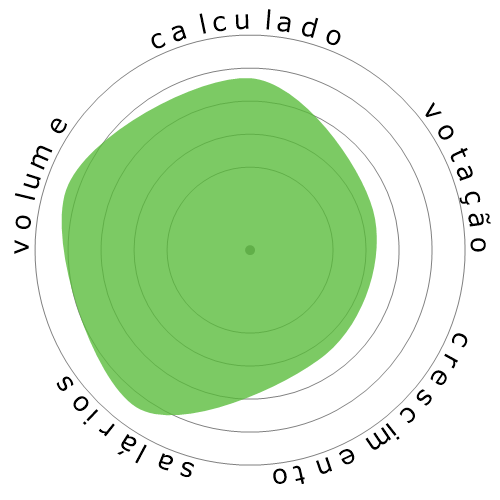Advogados
Para Onde Você Gostaria de Ir a Seguir?
Ou, explore esta profissão em maior detalhe...


O que este floco de neve mostra?
O que é isto?
Nós classificamos os trabalhos usando quatro fatores. Estes são:
- Chance de ser automatizado
- Crescimento do trabalho
- Salários
- Volume de posições disponíveis
Estes são alguns pontos chave para pensar quando estiver procurando um emprego.
As pessoas também visualizaram
Risco de automação calculado
Risco Baixo (21-40%): Trabalhos neste nível têm um risco limitado de automação, pois exigem uma mistura de habilidades técnicas e centradas no ser humano.
Mais informações sobre o que é essa pontuação e como ela é calculada estão disponíveis aqui.
Enquete do usuário
Nossos visitantes votaram que estão incertos se esta ocupação será automatizada. No entanto, os funcionários podem encontrar tranquilidade no nível de risco automatizado que geramos, que mostra 23% de chance de automação.
O que você acha que é o risco da automação?
Qual é a probabilidade de que Advogados seja substituído por robôs ou inteligência artificial nos próximos 20 anos?
Sentimento
O gráfico a seguir é exibido onde há votos suficientes para produzir dados significativos. Ele mostra os resultados das enquetes dos usuários ao longo do tempo, fornecendo uma indicação clara das tendências de sentimento.
Sentimento ao longo do tempo (trimestralmente)
Sentimento ao longo do tempo (anualmente)
Crescimento
Espera-se que o número de vagas de emprego para 'Lawyers' aumente 5,2% até 2033
Emprego total e estimativa de vagas de emprego
As projeções atualizadas são devidas 09-2025.
Salários
Em 2023, o salário anual mediano para 'Lawyers' foi de $ 145.760, ou $ 70 por hora
'Lawyers' receberam 203,3% a mais do que o salário médio nacional, que era de $ 48.060
Salários ao longo do tempo
Volume
A partir de 2023 havia 731.340 pessoas empregadas como 'Lawyers' dentro dos Estados Unidos.
Isso representa cerca de 0,48% da força de trabalho empregada em todo o país
Dito de outra maneira, cerca de 1 em 207 pessoas são empregadas como 'Lawyers'.
Descrição do trabalho
Representar clientes em litígios criminais e civis e outros processos legais, elaborar documentos jurídicos ou gerenciar ou aconselhar clientes sobre transações legais. Podem se especializar em uma única área ou podem atuar amplamente em muitas áreas do direito.
SOC Code: 23-1011.00
Comentários (233)
They'll do less errors, and don't require sleep. No more receptionist that is away. Longer opening hours.
Why do you say robots have no empathy, you fillthy racist? They have it. Robots would probably beat you up.
Not that I'd expect someone who doesn't even know the definition of 'racist' and just flings the word around however would know what empathy is...
And besides, you never even addressed what they said. They didn't even bring up empathy, as their point was about people not wanting a robot to defend them. You've brought up a completely nonsensical rebuttal to an argument that doesn't exist.
These are the tasks that robots won't be able to fulfill for at least a decade from now.
These are the tasks that robots won't be able to fulfill for at least a decade from now.
Responder ao comentário